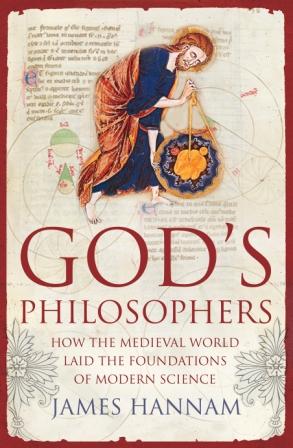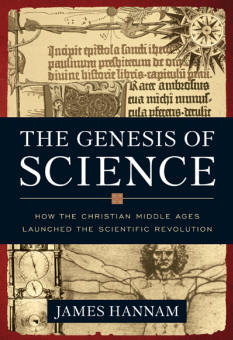
|
If you have enjoyed Bede's Library, you can order my book, The Genesis of Science: How the Christian Middle Ages Launched the Scientific Revolution (US) from Amazon.com or God's Philosophers: How the Medieval World Laid the Foundations of Modern Science (UK) from Amazon.co.uk. |
|
For my latest thoughts on science, politics, religion and history, read Quodlibeta
|
How modern science provides the evidence against atheism
![]()
A review of Modern Physics and Ancient Faith
Stephen Barr, Notre Dame 2003
I have to admit to having something of a bee in my bonnet over the frequency that we hear the old myth about the conflict between science and religion. Today it is kept going by extremists on both sides of the evolution debate, but it has little historical relevance and may even be the opposite of the truth. Even so, to the man on the street, science has comprehensively taken over the turf of religion which he believes has been beating a retreat for centuries. The view that science has won the battle to be recognised as the only valid form of knowledge is called scientism.
In this new book, a University of Delaware Professor of Physics, Stephen Barr, sets out to show that, in reality, there is plenty of room for God at the frontiers of modern physics. Along the way, he briefly debunks the idea of a historical conflict and shows us that many of the alleged victories of science were over straw men. He is at pains to demonstrate that the theologians of the Middle Ages were a good deal more subtle and circumspect than they are usually given credit for as well as showing that atheists have had their fair share of defeats at the hands of science too. Barr has not written a philosophical monograph but a piece of first class popular philosophy. He is quite honest that the argument is not about finding proof but achieving credibility. Many people who know almost nothing about modern science still feel they are justified in thinking it has debunked theism. Barr shows them just how wrong they are and his book will come as a terrible shock to those complacent atheists who think that God is so disproved and that they do not even have to bother thinking about the issues themselves. Hence, Barr is trying to throw a spanner into the works of materialism and scientism by showing that they are almost certainly unable to deal with much of the latest work in quantum mechanics, mathematical logic and cosmology.
This book, beautifully presented by Notre Dame and with a full index and copious notes, deserves to be as widely read as Richard Dawkins, Peter Atkins and those on the other side of the debate. Although Barr is a physics professor, he can communicate ideas to the layman even if he does feel compelled to relegate some of the toughest concepts to the appendices. He is also careful to try and set out all sides of the argument, especially in mentioning alternative ideas that might explain matters as well as his preferred option of theism.
I believe Barr is right in his rejection of materialism as the most credible metaphysical system on which to base science. As this book explains, the continuing success of materialism is a hangover from the nineteenth century when nearly everybody was a naïve realist and science looked like sweeping all before it. In an eternal Newtonian universe, the concept that only matter and energy existed was tenable. In today’s rather more mysterious world, it is not. Admittedly Barr is preaching to the choir in my case – I rejected atheism while actually reading for a Physics degree at university for much the reasons he delineates here.
After an introductory historical sketch, Barr organised his material into six broad sections. These are roughly as follows: The Big Bang as the beginning of the universe; The requirement for a first cause; The fine tuning of the constants of nature; The failure of materialist ideas for the mind; How Godel’s theorem shows the mind cannot be a computer; Quantum mechanics requiring a non-physical observer.
The Big Bang is essentially presented as an example of where materialists found their assumptions confounded and theists were vindicated. The development of this theory is outlined with particular attention to attempts by the likes of Fred Hoyle to avoid the uncomfortable implications of a beginning for the universe. The moral of this story is that materialists have a philosophical bias and are no more objective than theists in how they go about science. The cosmological argument for a First Cause begins with the church fathers but is updated using the trends we find in science. Barr argues that where we see order, science tends to reveal even deeper underlying order. From this we can look to the source of all order being the ultimate cause. Peter Atkins, seeking an atheist creation myth, argued in Creation Revisited that the ultimate reality had to be completely simple which, of course, the theist would agree with. But whereas the theist sees ultimate order in God, Atkins finds he has to build order out of nothing and hence produces the least plausible creation account ever written. Barr knows when he cannot provide a definite answer and so leaves us with suggestions that point towards to theistic answer rather than trying to become dogmatic. He does, in my opinion, make one mistake when he mentions that he is not convinced by the ability of the neo-Darwinian synthesis to fully explain evolution or the possibility of a chemical explanation for the origin of life. However, he says he will make no use of this argument beyond flagging it and pointing to the work of Michael Behe. Given this is outside his area of expertise, I would have preferred him to avoid this matter altogether rather than erect a marker that will certainly be used to attack him and thus enable his opponents to avoid his main arguments. On fine tuning, Barr gives many examples of both physicists who have been concerned about the anthropic coincidences and the coincidences themselves. This chapter is generally well argued with the weak anthropic principle explained and refuted together with many of the other common objections. Again, this is a question of credibility rather than proof so while the fine tuning argument does not conclusively demonstrate an intelligence behind the universe, it does put that idea in pole position.
We then move beyond physics and onto the question of freewill. This takes Barr outside his professional sphere but he remains a reliable guide. He runs through the definitions of freewill and the arguments for its existence. He then presents a case for how mind cannot be a function of matter alone. Ultimately, materialism must deny freewill and rationality as neither of these are explicable as purely physical processes. Barr insists that denying these is far more irrational (and indeed must be as rationality itself is denied) than believing in a non-physical mind. In The Emperor’s New Mind, Roger Penrose popularised the difficulties that Gödel’s theorum causes for those who claim that the brain is a computer. Barr picks this argument up and explains it in a fashion clear to the layman while giving a more rigorous treatment of the proof in an appendix. I would have liked to have seen more engagement with Penrose’s opponents, especially Daniel Dennett, but Barr is more interested in ensuring that the argument is well stated than giving a detailed critique of all objections. I particularly enjoyed this section of the book as I have long been looking for an accessible introduction to the issue. Finally, Barr examines the implications of the Copenhagen interpretation of quantum mechanics. Philosophers of science will find his treatment somewhat shallow while very possibly agreeing with his conclusions. Some scientists may just find it quite disturbing that Kantian idealism has managed to creep into physics. Barr argues that as the observer cannot be included in the model of quantum mechanics, we are left with needing the mind as an entity outside physics in order to do this job.
This book is intended as a clear statement from one side of the argument between theism and atheism/materialism. It is not a philosophically nuanced analysis of the debate but a clear exposition of important issues intended for non-specialist readers. As Barr repeatedly makes clear, he is dealing in issues of credibility and not proof. In this book, he has shown the credibility of theism has increased markedly and it deserves both a wide readership and a full response.
Back to contents
![]()

